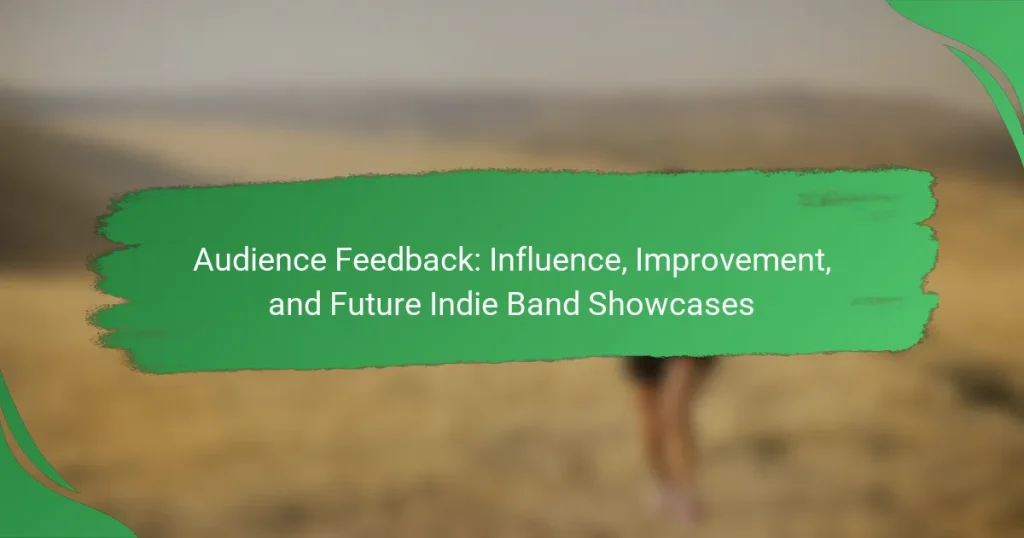Audience feedback is vital for indie bands, as it provides essential insights into performance quality and audience preferences. By actively engaging with fans through surveys and social media, bands can identify areas for improvement and enhance their showcases. Implementing this feedback allows for a more impactful and memorable experience, ultimately fostering a stronger connection with their audience.

How can audience feedback influence indie band showcases?
Audience feedback plays a crucial role in shaping indie band showcases by providing insights into performance quality, audience preferences, and overall engagement. By actively listening to their fans, bands can refine their shows and create a more impactful experience.
Enhanced performance quality
Audience feedback can significantly enhance the quality of performances by identifying strengths and weaknesses. Bands can solicit opinions on aspects such as vocal delivery, instrumental proficiency, and stage presence, allowing them to focus on areas needing improvement.
For example, if fans consistently mention a desire for tighter harmonies, the band can prioritize vocal practice to address this feedback. Regularly incorporating audience insights can lead to noticeable improvements in overall performance quality.
Increased audience engagement
Engaging with the audience through feedback fosters a sense of community and connection. When bands actively seek and respond to input, fans feel valued and are more likely to participate in future shows.
Strategies such as post-show surveys or social media polls can help gather feedback. This not only boosts engagement but also encourages fans to share their experiences, further promoting the band’s visibility and appeal.
Tailored setlists
Feedback can guide bands in creating setlists that resonate with their audience. By analyzing which songs receive the most positive reactions, bands can prioritize fan favorites and introduce new material strategically.
For instance, if a particular song consistently excites the crowd, it should be a staple in future performances. Tailoring setlists based on audience preferences can lead to more dynamic and memorable shows.
Improved marketing strategies
Understanding audience feedback helps indie bands refine their marketing strategies. Insights into what attracts fans can inform promotional efforts, from social media campaigns to merchandise offerings.
For example, if feedback indicates that fans love behind-the-scenes content, bands can create more engaging social media posts or videos. This targeted approach can enhance visibility and drive ticket sales for future showcases.
Stronger fan relationships
Actively seeking and responding to audience feedback strengthens relationships between bands and their fans. When fans see their opinions valued, it fosters loyalty and encourages ongoing support.
Regularly acknowledging feedback during performances or on social media can create a more personal connection. This relationship-building can lead to increased attendance at shows and a more dedicated fan base over time.

What methods can be used to gather audience feedback?
Gathering audience feedback is essential for indie bands to understand their performance impact and areas for improvement. Effective methods include post-show surveys, social media polls, live feedback sessions, and online review platforms, each offering unique insights into audience experiences.
Post-show surveys
Post-show surveys are a direct way to collect feedback from attendees shortly after the performance. These surveys can be distributed via email or as paper forms at the venue, allowing fans to share their thoughts while the experience is still fresh. Aim for concise surveys with 5-10 questions to maximize response rates.
Consider including a mix of rating scales and open-ended questions to capture both quantitative and qualitative data. For example, ask attendees to rate their overall experience on a scale of 1 to 5 and provide space for comments on specific aspects like sound quality or song selection.
Social media polls
Social media polls are an engaging way to gather audience feedback in real-time. Platforms like Instagram and Twitter allow bands to create quick polls that can reach a broad audience. Use these polls to ask specific questions about song preferences or future show locations.
Keep polls simple and focused, as they should encourage quick participation. For instance, a poll asking fans to choose between two songs for the next setlist can generate excitement and provide valuable insights into audience preferences.
Live feedback sessions
Live feedback sessions involve direct interaction with the audience, often held immediately after a performance. These sessions can take the form of Q&A discussions or informal meet-and-greets where fans can share their thoughts. This method fosters a personal connection and can yield in-depth feedback.
To facilitate effective feedback, create a welcoming environment and encourage open dialogue. Consider using guiding questions to steer the conversation, such as asking what songs resonated most or how the performance could be improved.
Online review platforms
Online review platforms like Google Reviews or Yelp provide a space for audiences to share their experiences publicly. Encouraging fans to leave reviews can enhance the band’s online presence and attract new listeners. However, it’s essential to monitor these platforms regularly to respond to feedback and manage the band’s reputation.
To maximize the benefits of online reviews, consider prompting fans to leave feedback after shows through social media or email campaigns. Highlighting positive reviews on your website or social media can also help build credibility and attract more attendees to future showcases.

How can indie bands improve their showcases based on feedback?
Indie bands can enhance their showcases by actively seeking and implementing audience feedback. This process involves adjusting performance elements, refining sound quality, incorporating suggestions, and selecting the right venues to create a more engaging experience.
Adjusting stage presence
Stage presence plays a crucial role in how audiences perceive a performance. Bands should consider feedback on their energy levels, interactions with the crowd, and overall visual appeal. For instance, if attendees mention a lack of engagement, bands might focus on eye contact and movement to create a more dynamic atmosphere.
Practicing in front of friends or using video recordings can help bands evaluate their stage presence. A checklist of key elements, such as audience interaction, movement, and facial expressions, can guide improvements.
Refining sound quality
Sound quality significantly impacts audience enjoyment. Bands should gather feedback on volume levels, clarity, and balance between instruments and vocals. If listeners report difficulty hearing lyrics or instruments, adjustments like sound checks and using quality equipment can help.
Investing in a good sound engineer or utilizing sound monitoring tools during rehearsals can ensure a better auditory experience. Regularly reviewing recordings of performances can also highlight areas needing refinement.
Incorporating audience suggestions
Audience suggestions can provide valuable insights into what resonates with listeners. Bands should create a system for collecting feedback, such as comment cards or online surveys, to understand preferences better. For example, if fans express interest in specific song choices or setlists, bands can tailor future performances accordingly.
It’s essential to prioritize actionable feedback and communicate any changes made based on audience input. This not only shows appreciation for their opinions but also fosters a stronger connection with fans.
Optimizing venue selection
The choice of venue can greatly influence the success of a showcase. Bands should consider feedback regarding venue size, acoustics, and atmosphere. If audiences mention overcrowding or poor sound, exploring alternative venues that better suit the band’s style and audience size may be necessary.
Researching local venues and their reputations can help bands find the right fit. Additionally, visiting potential venues and assessing their layout and sound capabilities can lead to more informed decisions that enhance overall performance quality.

What are the key criteria for selecting venues for indie band showcases?
Choosing the right venue for indie band showcases involves several key criteria that can significantly impact the success of the event. Important factors include audience capacity, location accessibility, sound quality, and cost considerations.
Audience capacity
Audience capacity is crucial as it determines how many fans can attend the showcase. Venues should ideally accommodate the expected turnout without feeling overcrowded or empty. A good rule of thumb is to select a venue that can hold at least 20-30% more than your anticipated audience to allow for walk-ins and last-minute ticket sales.
Consider the type of experience you want to create. Smaller venues can foster intimacy, while larger spaces may provide a more energetic atmosphere. Balance capacity with the vibe you wish to achieve.
Location accessibility
Location accessibility affects how easily fans can reach the venue. Choose a site that is well-connected by public transport and has ample parking options. Venues located in central areas typically attract more attendees due to convenience.
Additionally, consider the surrounding neighborhood. A safe and vibrant area can enhance the overall experience, encouraging fans to arrive early or stay late to explore local attractions.
Sound quality
Sound quality is a vital aspect of any live music event. Ensure the venue has a good reputation for acoustics and that it is equipped with quality sound systems. Poor sound can detract from the performance and leave a negative impression on attendees.
Before finalizing a venue, attend a few shows there to assess the audio experience. If possible, consult with sound engineers or other bands who have performed at the venue for their insights.
Cost considerations
Cost considerations play a significant role in venue selection. Assess not only the rental fees but also additional expenses such as insurance, staffing, and equipment rentals. Aim for venues that offer transparent pricing structures to avoid unexpected costs.
When budgeting, factor in potential revenue from ticket sales and merchandise. A venue that may seem expensive upfront could be worth it if it attracts a larger audience and generates higher sales.


